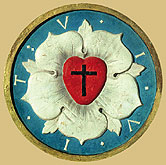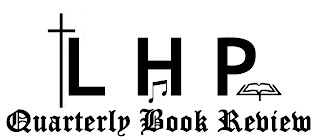CCLE & LHP Review: Catechesis
MacPherson, Ryan C. Studying Luther's Large Catechism: A Workbook for Christian Discipleship. Mankato, Minnesota: The Hausvater Project, 2012. 100 Pages. Paper. $6.95. (Bulk purchases for as low as $3.00.) www.hausvater.org (CCLE, LHP)
This review is our first official Liturgy, Hymnody, and Pulpit Quarterly Book Review cross-post with The Consortium for Classical and Lutheran Education.
Some introductions are in order.
Some introductions are in order.
Liturgy, Hymnody, and Pulpit began as a newsletter to pastors, musicians, and laypeople in the Wyoming District of The Lutheran Church--Missouri Synod from our Worship Chairman to ease the transition from The Lutheran Hymnal, Lutheran Worship, and Hymnal Supplement 98 to Lutheran Service Book. Early on, we recommended books, CDs, and music. Those recommendations eventually became book reviews.
In Advent 2006, LHP Quarterly Book Review was born. In our first three years, we published 600 pages of book reviews and reviews of other resources, sermons, articles, and editorials.
Beginning with Volume 4, LHP QBR switched to a blog format. Since adopting the blog format, we have been able to forward interesting posts from other blogs for your consideration and reflection. We're now in our 6th year. In response to an expressed need, we now have two sub blogs that both feed into Liturgy, Hymnody, and Pulpit Quarterly Book Review. Readers that wish to receive only our forwards can now also go to http://lhpfwd.blogspot.com/.Readers that wish to only receive our original book and resource reviews and be notified of new resources that we have received may go to http://lhplbr.blogspot.com/,the LHP Lutheran Book Review blog.
The Consortium for Classical and Lutheran Education encourages and serves families, teachers, and schools working to restore the classical arts of learning and the best traditions of Lutheran education.
The CCLE cultivates this restoration through educational conferences, online resources for teachers and parents, and accreditation for classical Lutheran schools. We heartily agree with Martin Luther that “You parents can provide your children with no greater gift than an education in the liberal arts.” The Consortium’s goal is to give every family the opportunity and tools to follow Luther’s advice.
A liberal arts education . . . the arts of classical learning . . . classical education all refer to the same tradition that has been the standard of excellence in education for more than 2000 years. To the ancient Greeks and to the Romans following in their footsteps, this was the only sort of education worthy of a free man, hence the term liberales artes, literally “the arts of freedom.”
It was a return to this classical learning that fueled the Reformation and the Renaissance. Martin Luther, Phillip Melanchthon, and Johann Sturm fostered and guided that restoration in the sixteenth century setting up schools that became the pattern and model for hundreds of years in America cultivating wisdom, eloquence, and piety.
Today, the CCLE is working for the restoration of this inheritance among Lutheran schools and educators.
“So it was done in ancient Rome. There boys were so taught that by the time they reached their fifteenth, eighteenth, or twentieth year they were well versed in Latin, Greek, and all the liberal arts (as they are called), and then immediately entered upon a political or military career. Their system produced intelligent, wise, and competent men, so skilled inevery art and rich in experience that if all the bishops, priests, and monks in the whole of Germany today were rolled into one, you would not have the equal of a single Roman soldier. As a result their country prospered; they had capable and trained men for every position. So at all times throughout the world simple necessity has forced men, even among the heathen, to maintain pedagogues and schoolmasters if their nation was to be brought to a high standard.” - Martin Luther
Back in April, we received the following book at CCLE's Wyoming mailing address.
Studying Luther’s Large Catechism: A Workbook for Christian DiscipleshipBy Ryan C. MacPherson, Ph.D.Always beginning with prayer and concluding with song, the twelve lessons in this study book provide biblical instruction concerning:
- The Ten Commandments
- The Apostles’ Creed
- The Lord’s Prayer
- Holy Baptism
- The Lord’s Supper
- Confession & Absolution
Studying Luther’s Large Catechism includes hymn lyrics for meditation as well as references to the accompaniment in seven widely used Lutheran hymnals: Christian Worship: A Lutheran Hymnal (1993), Evangelical Lutheran Hymnary (1996), Lutheran Book of Worship (1978), The Lutheran Hymnal (1941), The Lutheran Hymnary (1913), Lutheran Service Book (2006), and Lutheran Worship (1982).Contents
12 lessons, each with carefully designed study questions:
- Introductory Materials:
- The Place of Martin Luther and His Catechisms in Church History
- How This Study Is Organized
- Supplemental Resources
- Suggestions for Teachers
- Lesson 1: Learning and Teaching God’s Word (The Prefaces to Luther’s Catechisms)
- Lesson 2: Trusting in and Calling upon God for Every Need (The First and Second Commandments)
- Lesson 3: Listening to God’s Word and Honoring Parents (The Third and Fourth Commandments)
- Lesson 4: Protecting Lives and Safeguarding Marriages (The Fifth and Sixth Commandments)
- Lesson 5: Respecting People’s Property and Honor (The Seventh and Eighth Commandments)
- Lesson 6: Serving in the Roles God Assigns (The Ninth and Tenth Commandments)
- Lesson 7: Worshiping One God in Trinity and the Trinity in Unity (The Apostles’ Creed)
- Lesson 8: Praising God through Prayer (The Lord’s Prayer: Introduction through Second Petition)
- Lesson 9: Praying to God for All Our Needs (The Lord’s Prayer: Third Petition through Doxology)
- Lesson 10: Becoming God’s Child through Holy Baptism (Holy Baptism)
- Lesson 11: Receiving the True Body and Blood of Our Lord (The Lord’s Supper)
- Lesson 12: Assured of Forgiveness and Empowered to Serve God (Absolution and the Table of Duties)
- Scripture Index
- General Index
Ordering Information
Studying Luther’s Large Catechism is available for:
- individual purchases at $6.95 per copy (via Amazon.com and other reputable booksellers); and,
- bulk purchases for as low as $3.00 per copy (contact us to request a price quote for your congregation or school; tax exempt ID required)
(The author receives no royalties; all net proceeds support the nonprofit mission of the Hausvater Project. To assist the Hausvater Project in providing quality publications at a low cost, please prayerfully consider making a charitable contribution.)Studying Luther’s Large Catechism serves as a companion to Concordia: The Lutheran Confessions—A Reader’s Edition of the Book of Concord (available from Concordia Publishing House) as welll as other printings of the Large Catechism, whether published in the Book of Concord or separately.
This book was my first exposure to the Hausvater Project. Just the very existence of a project that would dare to encourage Lutherans to "man up" as Christian heads of households was encouragement to me. Each portion of the six chief parts in the LCMS edition of Luther's Small Catechism with Explanation addresses Christian husbands and fathers with these words:
As the head of the family should teach it in a simple way to his household.
Amen. Gentlemen, let's get to work!
I generally begin my catechesis classes by thanking husbands/parents for the invitation to help teach the Christian faith to their wives/children.
And then in addition, I decided to do something different for the 8th Grade Catechism class I began last fall: teach Luther's Large Catechism.
What a radical idea!
I claim no originality. After all, Dr. Luther taught us all (if we read it) in the Preface of the Small Catechism:
So we did.
I very much enjoyed the adventure with three young adults from our congregation. All three had been baptized right after birth and were brought to Church and Sunday School as very young children. All three had spent at least several years at our congregation's now-CCLE-accredited Classical Lutheran Grammar school. And it showed.
These three confirmands-to-be were joined by a young lady who had been confirmed the year before. She wanted to get into the Large Catechism (in addition to taking organ lessons, making liturgical banners, etc.). The five of us met for 90 minutes on Sunday afternoons to study Luther's Large Catechism. We used the paperback edition with study questions from Concordia, derived from the translation in Concordia: The Lutheran Confessions.
What I tried to do to integrate prayer and hymnody into the Large Catechism, Ryan MacPherson has done for all of us!
He incorporates hymnody and prayer from Evangelical Lutheran Hymnary, the very impressive 1996 hymnal of the Evangelical Lutheran Synod.
Other Lutherans, including LCMS congregations using Lutheran Service Book, will have little trouble adapting Studying Luther's Small Catechism for their use.
I will personally use MacPherson's workbook of study questions, and hymn and collect suggestions in my new Eighth Grade Catechism class this fall. I will spread out his twelve lessons into 24-30.
I generally begin my catechesis classes by thanking husbands/parents for the invitation to help teach the Christian faith to their wives/children.
And then in addition, I decided to do something different for the 8th Grade Catechism class I began last fall: teach Luther's Large Catechism.
What a radical idea!
I claim no originality. After all, Dr. Luther taught us all (if we read it) in the Preface of the Small Catechism:
Third, after you have so taught them from this short catechism, take up the Large Catechism and use it to give them a broader and richer understanding...
So we did.
I very much enjoyed the adventure with three young adults from our congregation. All three had been baptized right after birth and were brought to Church and Sunday School as very young children. All three had spent at least several years at our congregation's now-CCLE-accredited Classical Lutheran Grammar school. And it showed.
These three confirmands-to-be were joined by a young lady who had been confirmed the year before. She wanted to get into the Large Catechism (in addition to taking organ lessons, making liturgical banners, etc.). The five of us met for 90 minutes on Sunday afternoons to study Luther's Large Catechism. We used the paperback edition with study questions from Concordia, derived from the translation in Concordia: The Lutheran Confessions.
What I tried to do to integrate prayer and hymnody into the Large Catechism, Ryan MacPherson has done for all of us!
He incorporates hymnody and prayer from Evangelical Lutheran Hymnary, the very impressive 1996 hymnal of the Evangelical Lutheran Synod.
Other Lutherans, including LCMS congregations using Lutheran Service Book, will have little trouble adapting Studying Luther's Small Catechism for their use.
I will personally use MacPherson's workbook of study questions, and hymn and collect suggestions in my new Eighth Grade Catechism class this fall. I will spread out his twelve lessons into 24-30.
We (both LHP QBR and CCLE) look forward to seeing more resources from the Hausvater Project!
The Rev. Paul J Cain is Pastor of Immanuel Lutheran Church, Sheridan,
Wyoming, Headmaster of Martin Luther Grammar School, Yellowstone
Circuit Visitor (LCMS Wyoming District), a member of the Board of
Directors of The Consortium for Classical and Lutheran Education,
Wyoming District Worship Chairman, and Editor of QBR.




